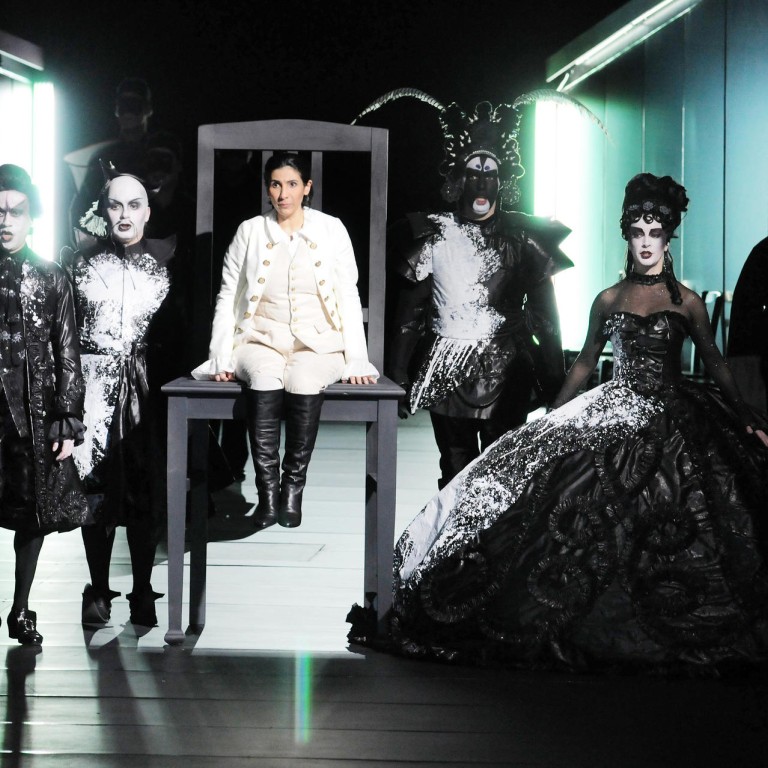
Composer weaves Chinese musical heritage into prequel to Wagner opera
Berlin-based composer Jeffrey Ching has woven his Chinese heritage into his prequel to Wagner's opera Lohengrin, writes Victoria Finlay
Wagner's opera begins with a swan pulling a boat across a lake in a magical forest where a child has gone missing, while in the outside world his sister is standing trial for his suspected murder. But what happens before that? Before that awful court case in the corrupt kingdom of Brabant?
That's a question the Berlin resident but Filipino-Chinese composer Jeffrey Ching had always wondered about, vaguely, at the back of his mind.
So when the Hong Kong Arts Festival decided to bring a full production of to town this year, they gave the Harvard-educated Ching the chance to find out. "Since my last project with the Arts Festival in 2012, Tisa [Ho, the executive director] and I were looking for a subject for a new chamber opera, something with fantastical elements. When she settled on , we thought why not find out what happened before the opera begins," Ching says in a phone interview from Berlin where he lives with his opera singer wife and two young children.
I wanted to show how different the hermit is from the people of the town...so I chose to overlay it with music from China at the time
He found medieval fairy stories and romances from all over Europe, and started reading. Each is slightly different, and Ching has chosen "his" version partly pragmatically - he has seven musicians and four singers for this concert version, titled , premiering in Hong Kong on Tuesday, so he has to keep it simple. And partly he has selected it for the most compelling libretto.
"I used a source from 1512 by Robert Copland, . I updated the text but did not modernise it. Actually I left some odd words in. 'Sclaunder' is such a good word - it means halfway between scandal and slander, a shameful catastrophe," Ching says.
Which is exactly what is threatened at the beginning of the story where a king returns from the Crusades to find that his beautiful queen appears to have given birth to seven puppies.

The babies are taken into the forest (in good fairy-tale tradition) to be killed. And in equally good fairy-tale tradition, the huntsman tasked with this crime hides the babies, where a hermit finds them. Sixteen years later the huntsman comes back. He is overjoyed and takes the chains from six of them to bring back to the king as proof … but when the six boys then turn into swans the frightened huntsman runs off, dropping five of the chains but still holding the sixth.
Lohengrin (called Helias in the Copland version) is the brother who never became a swan. And there is one swan who never got his chain back, so he could never turn back into a human.
Ching, 48, spent his childhood in the 1960s and '70s in Manila where his father ran a steel business and his mother worked as a physician. He grew up next to a museum of Chinese scrolls (paintings and calligraphy). An émigré in Manila, his grandfather collected fine artworks in danger of being destroyed in the war, saving them until he could restore them to a China in peace (they are now in the Shanghai Museum).
"The world these scrolls came from seemed to us very remote and irrelevant. I was young when my grandfather died and nobody was there to explain to us what the paintings were about, and that's a pity," the composer says. "But it gave a sense that the culture of ancient China was an elusive never-never land that was also always present. Those old scrolls made me feel a lifelong spiritual link to China."
This link often comes through in his music. The hermit in , for example, is represented by references to music from Song dynasty China (written at the time of the Crusades, but in a different part of the world).
"I wanted to show how different the hermit is from the people of the town. It was as if he was from another world, so I chose to overlay it with music from China at the time … the musician plucks the strings inside the piano to represent the Chinese zither [ ]."
Ching is celebrated for his mostly atonal, exploratory music. The general manager of Theatre Erfurt in Germany said of his 2009 opera : "I find the music of Jeffrey Ching subtler, more exploratory and enriching than that of Philip Glass."
Like a cryptic crossword puzzle there will be clues and playful games from this clever mind: Ching not only went to Harvard, he graduated double magna cum laude and won the John Harvard Scholarship for "academic achievements of the highest distinction" - twice.
For example, ends with direct quotations from Wagner's . You hear the beginning in the original key and superimposed on that are Helias' lines bidding farewell to his family, but his lines also have a flavour of Song dynasty music to show Helias is closer to the world of the hermit than ever before, and grateful that the hermit saved his life.
Or when Ching decided to represent the swans, he went to the trouble of transcribing the music of several different swan calls in the wild before settling on the trumpeter swan of North America because it sounds "like a muted brass instrument".
"When I write atonal music, which is all the time, I'm very aware of the harmonic implications of what I'm doing," says Ching. "And I still like to keep my hand in. That training I had at Harvard comes in very handy. There are works of mine that don't allude to classical composition at all, but I like to feel they are there at my fingertips should I need to draw on them."
Before Brabant,

